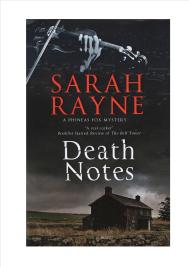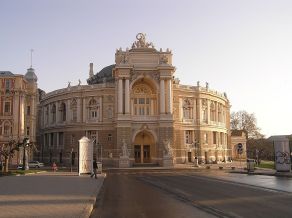 While writing Death Notes, (Book One of the Phineas Fox series), I was initially delighted to discover the existence of the Opera and Ballet Theatre of Odessa – a building that had the splendid address of No 1 Tchaikovsky Street.
While writing Death Notes, (Book One of the Phineas Fox series), I was initially delighted to discover the existence of the Opera and Ballet Theatre of Odessa – a building that had the splendid address of No 1 Tchaikovsky Street.
The theatre had been burned down towards the end of the 19th century, and it seemed that this might all fit beautifully into a plot that wove in the assassination of Tsar Alexander II in 1881. (Less well-known than the butchery meted out to his grandson, Nicholas and family in 1917, but sufficiently documented to make it possible to disinter the salient facts).

I wrote four chapters, with happy diligence, making use of this Russian theatre. Then I discovered that it had burned down in January 1873 – which was eight years too soon for the plot. I cursed the person who had struck the matches (tinder box?) in 1873 for not waiting just a few more years before consigning a beautiful old theatre to blackened rubble, and then I muttered imprecations against the tsar’s assassins for not bringing their dastardly plot forward, and committing the foul deed in 1873 instead of 1881.
And since the dates of assassinations can’t be shifted, any more than the burning of illustrious theatres can be put forward, in the end I resorted to the ploy of most writers in such a situation. I set about creating a fictional theatre. This seemed a very good idea, until I hit the problem of what to call it. Names matter, and the theatre I was conjuring up, the theatre that would stand somewhere in Tchaikovsky Street (because I wasn’t going to lose that terrific street name), had to sound authentic and romantic.
 An English theatre mightn’t have been difficult. A few years earlier, writing Ghost Song, I had created the Tarleton Theatre, the name a nod to the memory of the Elizabethan clown actor, Richard Tarleton. I had even called the theatre yard Platt’s, from the old word for a stage plot (layout). But this was Russia.
An English theatre mightn’t have been difficult. A few years earlier, writing Ghost Song, I had created the Tarleton Theatre, the name a nod to the memory of the Elizabethan clown actor, Richard Tarleton. I had even called the theatre yard Platt’s, from the old word for a stage plot (layout). But this was Russia.
I rummaged the bookshelves, scouring dictionaries and reference books and encyclopediae to find a suitable name. I trawled the internet. Chapter 11 lay abandoned and incomplete on the hard drive. Chapter 12 was still worryingly embryonic (scrappy notes in Word), and Chapter 13 was a mere hope somewhere on the horizon, with no Word or, indeed, words to its name. Chapters 4-10, all containing the infuriatingly inaccurate references to the Odessa Theatre, patiently awaited amendment. My agent and my editor patiently awaited a manuscript.
Then I discovered a wonderful piece of Russian theatre folklore – that of the ancient  people called the skomorokhi.
people called the skomorokhi.
The skomorokhi appear to be part of an astonishingly old tradition – dating to around the ninth or tenth century, and there are frescoes portraying them in Kiev, thought to date to the 11th century. They were medieval, East Slavic harlequins – actors, who could also sing, dance, play musical instruments and compose for their oral/musical and dramatic performances.
Traces of them and their legend are sprinkled over the centuries, and the Tale of Bygone Years, sometimes known as the Primary Chronicle which covers about 850 to 1110, uncompromisingly denounces the skomorokhi as devil servants,
Several authorities suggest that the word, Skomorokh, is linked to the Italian Scaramouch – the clown character of Italian commedia dell’arte, which literally translated as Little Skirmisher. Harlequin and Columbine are known to most people, but that third character, Scaramouch, is perhaps not quite as familiar.
And yet Scaramouch is still around. In the 1906 fantasy play, Love in a Dutch Garden, (filmed silently in 1918 as Prunella,) a character says, ‘Scaramel, I am tempted…’ Scaramel’s reply is, ‘Always yield to temptation.’ Which may well be borrowed from the infamous Oscar Wilde line, but does go to prove that Scaramel/Scaramouch, knew that if you’re going to plagiarise, you choose the best loot you can.
In Freddie Mercury’s mind-blowing Bohemian Rhapsody, he gives Queen a line that asks, ‘Scaramouche, Scaramouche, will you do the fandango…?
It’s likely that Scaramouche and certainly the long-ago Skomorokh performers, could indeed do the fandango and any one of a dozen other dances.
So there it was, the theatre’s name. Never mind that I couldn’t pronounce it and that I had to enter it into the spell-checker on the computer for auto-completion of the word, it was undoubtedly the Skomorokh Theatre. The charismatic 19th century violinist, Roman Volf, whose mysterious and scandalous life lay at the heart of the book, could wander through the ruins, weaving plots of his own, possibly in company with a suitably alluring lady.
Best of all, The Skomorokh Theatre itself could burn down in the right year for the plot of Death Notes.
Fiction is frequently so much more easy to manipulate than fact.